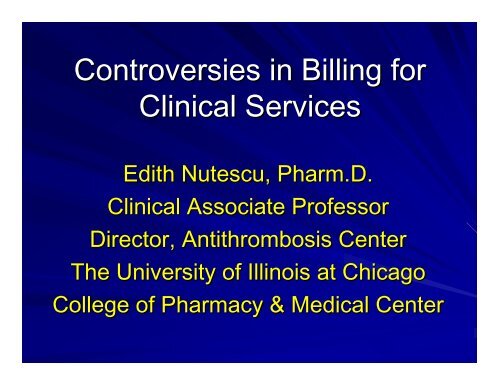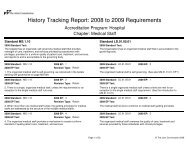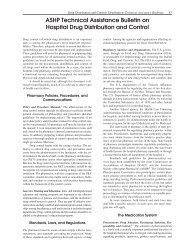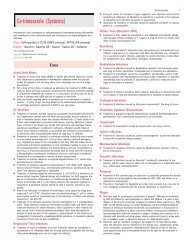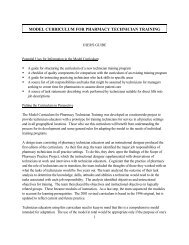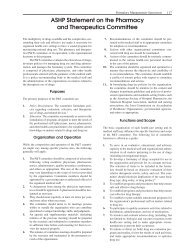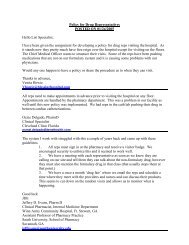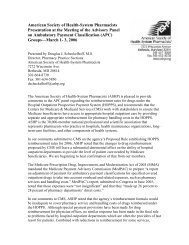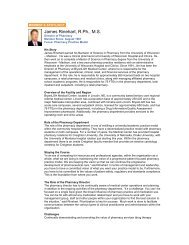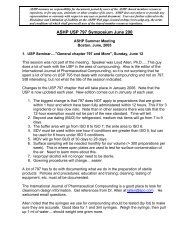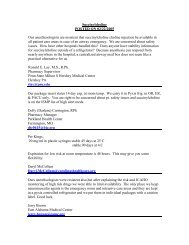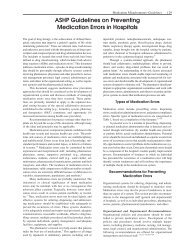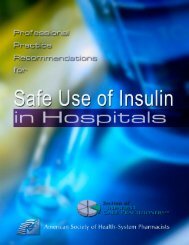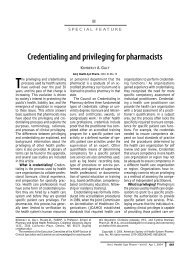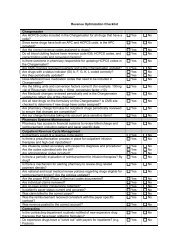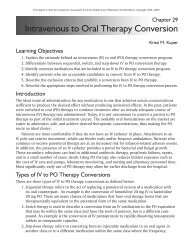Controversies in Billing for Clinical Services - American Society of ...
Controversies in Billing for Clinical Services - American Society of ...
Controversies in Billing for Clinical Services - American Society of ...
You also want an ePaper? Increase the reach of your titles
YUMPU automatically turns print PDFs into web optimized ePapers that Google loves.
<strong>Controversies</strong> <strong>in</strong> Bill<strong>in</strong>g <strong>for</strong><br />
Cl<strong>in</strong>ical <strong>Services</strong><br />
Edith Nutescu, Pharm.D. Pharm.D<br />
Cl<strong>in</strong>ical Associate Pr<strong>of</strong>essor<br />
Director, Antithrombosis Center<br />
The University <strong>of</strong> Ill<strong>in</strong>ois at Chicago<br />
College <strong>of</strong> Pharmacy & Medical Center
Objectives<br />
Review various bill<strong>in</strong>g options <strong>for</strong> cl<strong>in</strong>ical<br />
pharmacy services <strong>in</strong> the outpatient sett<strong>in</strong>g<br />
Highlight accepted “bill<strong>in</strong>g” procedures <strong>in</strong><br />
various sett<strong>in</strong>gs such as…<br />
– Hospital-based Hospital based cl<strong>in</strong>ics<br />
– Physician Office-based Office based cl<strong>in</strong>ics<br />
– Community Pharmacy-based Pharmacy based cl<strong>in</strong>ics<br />
Highlight current controversies <strong>in</strong> atta<strong>in</strong><strong>in</strong>g<br />
reimbursement <strong>for</strong> cognitive services
Recent Milestones Affect<strong>in</strong>g Bill<strong>in</strong>g<br />
Potential <strong>for</strong> Pharmacists<br />
Pharmaceutical Care / Collaborative<br />
Practice Concept:<br />
“Pharmaceutical care <strong>in</strong>volves the process<br />
through which a pharmacist cooperates with a<br />
patient and other pr<strong>of</strong>essionals <strong>in</strong> design<strong>in</strong>g,<br />
implement<strong>in</strong>g, and monitor<strong>in</strong>g a therapeutic<br />
plan that will produce specific therapeutic<br />
outcomes <strong>for</strong> the patient.”<br />
Hepler CD, Strand LM. AJHP 1990;46:533-43.
Recent Milestones Affect<strong>in</strong>g Bill<strong>in</strong>g<br />
Potential <strong>for</strong> Pharmacists<br />
Focus on patient safety, impact <strong>of</strong><br />
medication adverse outcomes<br />
Increas<strong>in</strong>g support <strong>of</strong> physicians and<br />
legislators <strong>for</strong> pharmacist cognitive<br />
services<br />
Current legislation – could have dramatic<br />
impact on reimbursement <strong>for</strong> pharmacist<br />
cognitive services
Recent Milestones Affect<strong>in</strong>g Bill<strong>in</strong>g<br />
Potential <strong>for</strong> Pharmacists<br />
Cl<strong>in</strong>ical Pharmacy <strong>Services</strong> & MTMS<br />
– Medication Therapy Management <strong>Services</strong><br />
(MTMS)<br />
A dist<strong>in</strong>ct service or group <strong>of</strong> services that<br />
optimize therapeutic outcomes <strong>for</strong> <strong>in</strong>dividual<br />
patients. Medication Therapy Management<br />
<strong>Services</strong> are <strong>in</strong>dependent <strong>of</strong>, but can occur <strong>in</strong><br />
conjunction with, the provision <strong>of</strong> a medication<br />
product<br />
MTMS Def<strong>in</strong>ition and Program Criteria by the ACMP, AACP, ACA, ACCP, ACCP,<br />
ASCP, APhA, ASHP, NABP, National Council <strong>of</strong> State Pharmacy<br />
Association Executives; July 2004 http://pstac.org/aboutus/mtms.pdf
Cl<strong>in</strong>ical Pharmacy <strong>Services</strong> & MTMS<br />
Examples <strong>of</strong> MTMS<br />
– Anticoagulation cl<strong>in</strong>ics<br />
– Lipid cl<strong>in</strong>ics<br />
– Asthma<br />
– Diabetes<br />
– Osteoporosis<br />
– Hypertension<br />
– Immunizations<br />
– Pharmacotherapy cl<strong>in</strong>ics
Cl<strong>in</strong>ical Pharmacy <strong>Services</strong> & MTMS<br />
Examples <strong>of</strong> MTMS <strong>in</strong> specific sett<strong>in</strong>gs<br />
– Hospital based cl<strong>in</strong>ics<br />
– Physician cl<strong>in</strong>ics<br />
– Community pharmacies<br />
– Independent cl<strong>in</strong>ics<br />
Other<br />
– Nurs<strong>in</strong>g homes<br />
– Home health care<br />
– Indian Health Service<br />
– Inpatient <strong>Services</strong>
Justification <strong>for</strong> Cl<strong>in</strong>ical <strong>Services</strong><br />
Direct revenue<br />
Improved patient outcomes<br />
Decreased healthcare costs<br />
Other
Justification <strong>for</strong> Cl<strong>in</strong>ical <strong>Services</strong><br />
Chiquette and Amato<br />
– Condition(s): Anticoagulation Disorders<br />
– Sett<strong>in</strong>g: Outpatient Cl<strong>in</strong>ic<br />
– Outcomes: Improved surrogate markers<br />
Decreased hospitalizations / ER visits<br />
Decreased thromboembolism / bleed<strong>in</strong>g<br />
Decreased healthcare costs<br />
Arch Intern Med 1998; 158:1641-7.
Justification <strong>for</strong> Cl<strong>in</strong>ical <strong>Services</strong><br />
Mississippi Medicaid Project<br />
– Condition(s): Asthma, diabetes, lipids, anticoagulation<br />
– Sett<strong>in</strong>g: Community pharmacies<br />
– Payer: Medicaid<br />
– Outcomes: Improved surrogate markers<br />
Decreased hospitalizations, ER visits<br />
Direct reimbursement from Medicaid<br />
AJHP 2003; 60(17):1720, 1722, 1724
Justification <strong>for</strong> Cl<strong>in</strong>ical <strong>Services</strong><br />
Asheville, NC Project<br />
– Condition(s): Diabetes education, blood pressure, and<br />
lipid management<br />
– Sett<strong>in</strong>g: Community pharmacies<br />
– Payer: City <strong>of</strong> Ashville &<br />
Mission St. Joseph’s Health System<br />
– Outcomes: Improved surrogate markers<br />
Decreased hospitalizations, ER visits<br />
Decreased sick days<br />
Increased prescription costs<br />
AJHP 2003; 60(17):1720, 1722, 1724
Justification <strong>for</strong> Cl<strong>in</strong>ical <strong>Services</strong><br />
Project ImPACT<br />
– Condition(s): Lipids<br />
– Sett<strong>in</strong>g: Community pharmacies<br />
– Payer: First party payers<br />
– Outcomes: Improved surrogate markers<br />
Direct revenue<br />
JAPhA 2000; 40:157-65
Methods <strong>for</strong> Reimbursement<br />
Methods <strong>for</strong> Reimbursement<br />
– Specific method selected depends on the<br />
Payer<br />
– Medicare, Medicaid, Third Party Payers, First Party<br />
Payers<br />
Sett<strong>in</strong>g<br />
– Hospital based cl<strong>in</strong>ics, Physician cl<strong>in</strong>ics, Community<br />
pharmacies, Managed Health Care, Other<br />
Pr<strong>of</strong>essional<br />
– Pharmacists<br />
Other methods<br />
– CLIA waived test<strong>in</strong>g
Methods <strong>for</strong> Reimbursement<br />
Payer<br />
– Medicare<br />
– Medicaid<br />
– Third Party Payers<br />
– First Party Payers
Methods <strong>for</strong> Reimbursement<br />
Medicare<br />
– Adm<strong>in</strong>istered via Centers <strong>for</strong> Medicare and Medicaid<br />
<strong>Services</strong> (CMS)<br />
– Providers are outl<strong>in</strong>ed <strong>in</strong> the Social Security Act<br />
– Pharmacists can be providers <strong>of</strong>:<br />
Mass immunizers<br />
Durable medical equipment<br />
Diabetes Education <strong>Services</strong><br />
MTMS <strong>Services</strong><br />
– Alternative strategies may be available <strong>for</strong> bill<strong>in</strong>g
Mass Immunizers<br />
Payment <strong>for</strong> the vacc<strong>in</strong>e, adm<strong>in</strong>istration<br />
Mass immunizer provider status<br />
– Pharmacist vs Pharmacy<br />
– Pharmacies/Institutions bill under their Medicare number<br />
State laws specify whether pharmacists can immunize<br />
and outl<strong>in</strong>e requirements<br />
CPT codes<br />
– Different <strong>for</strong> Medicare and Non-Medicare<br />
Non Medicare<br />
– G0008, G0009 vs 90657, 90471<br />
ICD-9 ICD 9 codes<br />
– V04.81 <strong>for</strong> <strong>in</strong>fluenza<br />
– V03.82 <strong>for</strong> pneumonia
DME (durable medical equipment)<br />
Medicare Part B<br />
Canes<br />
Walkers<br />
Hospital beds<br />
Scooters<br />
Respiratory equipment<br />
Supplies <strong>for</strong> diabetes, ostomy, ostomy,<br />
or wound care
Outpatient Diabetes Self- Self<br />
Management Tra<strong>in</strong><strong>in</strong>g (ODSMT)<br />
The tra<strong>in</strong><strong>in</strong>g must be ordered by the physician or<br />
qualified nonphysician provider.<br />
<strong>Services</strong> must be provided by an ADA certified<br />
multidiscipl<strong>in</strong>ary team.<br />
– Must <strong>in</strong>clude a dietitian and certified diabetes educator (may be<br />
a pharmacist).<br />
Medicare beneficiaries; paid by Medicare Part B.<br />
Payment to employer/facility.<br />
“Allows the pharmacist to become a revenue stream <strong>for</strong><br />
the hospital.”<br />
Covers up to 10 hours <strong>of</strong> tra<strong>in</strong><strong>in</strong>g<br />
– HCPCS code G0108 – <strong>in</strong>dividual and G0109 – group tra<strong>in</strong><strong>in</strong>g<br />
– Coverage through Medicaid and private <strong>in</strong>surance varies
MTMS: New Advances <strong>in</strong> DIRECT<br />
Bill<strong>in</strong>g <strong>for</strong> Pharmacy <strong>Services</strong><br />
CPT-III CPT III is a set <strong>of</strong> temporary codes <strong>for</strong> emerg<strong>in</strong>g<br />
technology, services, and procedures. Allows <strong>for</strong> data<br />
collection and report<strong>in</strong>g.<br />
Medication Therapy Management<br />
– 0115T - Medication therapy management service(s) service(s)<br />
provided by a pharmacist, <strong>in</strong>dividual, face-to face to-face face with<br />
patient, <strong>in</strong>itial 15 m<strong>in</strong>utes, with assessment, and<br />
<strong>in</strong>tervention if provided; <strong>in</strong>itial encounter<br />
– 0116T - subsequent encounter<br />
– +0117T - each additional 15 m<strong>in</strong>utes<br />
http://www.ama-assn.org/ama/pub/category/3885.html
Methods <strong>for</strong> Reimbursement<br />
Alternative Strategies<br />
– “Incident to” Physician <strong>Services</strong><br />
– Outpatient Prospective Payment System<br />
– Direct bill<strong>in</strong>g<br />
– CLIA waived labs<br />
Pharmacotherapy 2003; 23(9):1153-66.
Methods <strong>for</strong> Reimbursement<br />
Incident to Physician <strong>Services</strong><br />
– Only <strong>for</strong> physician <strong>of</strong>fices<br />
– Physician charges <strong>for</strong> non-physician non physician services<br />
– Strict criteria <strong>for</strong> use<br />
– Low level <strong>of</strong> reimbursement<br />
– Restricted to CPT code 99211
Methods <strong>for</strong> Reimbursement<br />
Incident to Physician <strong>Services</strong><br />
– Criteria <strong>for</strong> use<br />
Integral component <strong>of</strong> the physician’s diagnosis<br />
and treatment<br />
Provided under direct supervision <strong>of</strong> physician<br />
Employee <strong>of</strong> the physician (this was removed)<br />
Ord<strong>in</strong>arily done <strong>in</strong> a physician’s <strong>of</strong>fice / cl<strong>in</strong>ic<br />
<strong>Services</strong> must be documented and medically<br />
necessary <strong>in</strong> order <strong>for</strong> payment to be made
Methods <strong>for</strong> Reimbursement<br />
Outpatient Prospective Payment System<br />
– Only <strong>for</strong> hospital-based hospital based cl<strong>in</strong>ics<br />
– Two components to the fee<br />
Pr<strong>of</strong>essional Fee<br />
Technical Fee or “Facility Fee”<br />
– Utilizes the APC codes (600, 601, 602)<br />
– Hospital gets to def<strong>in</strong>e the code criteria<br />
– Reimbursement is made to the hospital
Bill<strong>in</strong>g Mechanisms<br />
CMS-1500 CMS 1500<br />
– Outpatient visits to physician<br />
– Immunizations<br />
– Laboratory Bill<strong>in</strong>g (CLIA Waivers)<br />
Superbills (UB-92/CMA (UB 92/CMA 1450)<br />
– Outpatient hospital based cl<strong>in</strong>ics<br />
– Inpatient <strong>Services</strong><br />
Others<br />
– PCCF (Pharmacist Care Claim Form)<br />
– Electronic Submission
Sample UB-92 UB 92 Form<br />
42 Rev CD 43 Description 44 HCPCS/Rates 45 Date 47 Charges<br />
510 Cl<strong>in</strong>ic 99211 4-1-05 32.00<br />
510 Cl<strong>in</strong>ic 99211 34.00<br />
300 PT/INR 85610 53.00<br />
67 PRIN. DIAG. CD<br />
ICD-9: 427.31 (A.Fib)
Example Revenue Codes<br />
General laboratory 300<br />
Hematology 305<br />
General Cl<strong>in</strong>ic 510<br />
Other Cl<strong>in</strong>ic 519<br />
Treatment room 761<br />
General Cardiology 480<br />
Rural Health Cl<strong>in</strong>ic 521
“Superbills Superbills”<br />
Superbills<br />
– Helps manage all the cod<strong>in</strong>g<br />
– Usually conta<strong>in</strong>s common<br />
CPT codes<br />
ICD-9 ICD 9 codes<br />
Lab codes<br />
Insurance <strong>in</strong><strong>for</strong>mation<br />
ICD-9<br />
CPT Codes<br />
Lab Codes
Methods <strong>for</strong> Reimbursement<br />
Direct bill<strong>in</strong>g<br />
– First pay payers or cash based services
Methods <strong>for</strong> Reimbursement<br />
CLIA-waived CLIA waived laboratory test<strong>in</strong>g<br />
– Low complexity laboratory tests<br />
– Typically f<strong>in</strong>ger stick tests<br />
Examples: blood glucose, INR, Cholesterol<br />
– Request reimbursement <strong>for</strong> lab tests<br />
Pharmacist can serve as the laboratory director<br />
Must have a CLIA waiver<br />
Can request Medicare number <strong>for</strong> labs<br />
Can request Medicaid number <strong>for</strong> labs<br />
http://www.cms.hhs.gov/clia/
Methods <strong>for</strong> Reimbursement<br />
Payer<br />
– Medicare<br />
– Medicaid<br />
– Third Party Payers<br />
– First Party Payers
Methods <strong>for</strong> Reimbursement<br />
Medicaid<br />
– Adm<strong>in</strong>istered by CMS<br />
– States can modify regulations via a waiver to<br />
<strong>in</strong>clude pharmacists<br />
– Examples:<br />
Mississippi Medicaid Project<br />
Iowa Medicaid Pharmaceutical Case Management<br />
Program<br />
Missouri Disease Management Program
Methods <strong>for</strong> Reimbursement<br />
Payer<br />
– Medicare<br />
– Medicaid<br />
– Third Party Payers<br />
– First Party Payers
Methods <strong>for</strong> Reimbursement<br />
Third Party Payers<br />
– Can be fee-<strong>for</strong> fee <strong>for</strong>-service service<br />
– Can be capitation / managed care<br />
– Each payer may be different<br />
Credential providers<br />
– Different requirements <strong>for</strong> credential<strong>in</strong>g providers<br />
– Different providers recognized<br />
– Different CPT codes may be allowed<br />
– Different reimbursement rates they will pay out<br />
Prior authorization<br />
– F<strong>in</strong>d out which CPT code to use<br />
– Authorized to provide a service per patient<br />
Just submit and go
Methods <strong>for</strong> Reimbursement<br />
Third Party Payers<br />
– CLIA-waived CLIA waived labs<br />
May be able to submit these services<br />
Capitated payers may have a specific lab<br />
contracted and reject submission
Methods <strong>for</strong> Reimbursement<br />
Payer<br />
– Medicare<br />
– Medicaid<br />
– Third Party Payers<br />
– First Party Payers
Methods <strong>for</strong> Reimbursement<br />
First Party Payers<br />
– Cash based services<br />
– Quick turn around time <strong>for</strong> payment<br />
– Can use <strong>for</strong> services that are not covered by<br />
Third Party Payers<br />
– CLIA-Waived CLIA Waived test<strong>in</strong>g
Methods <strong>for</strong> Reimbursement<br />
Methods <strong>for</strong> Reimbursement<br />
– Specific method selected depends on the<br />
Payer<br />
– Medicare, Medicaid, Third Party Payers, First Party<br />
Payers<br />
Sett<strong>in</strong>g<br />
– Hospital based cl<strong>in</strong>ics, Physician cl<strong>in</strong>ics, Community<br />
pharmacies, Managed Health Care, Other<br />
Pr<strong>of</strong>essional<br />
– Pharmacists<br />
Other methods<br />
– CLIA waived test<strong>in</strong>g
Methods <strong>for</strong> Reimbursement<br />
Hospital-Based Hospital Based Cl<strong>in</strong>ics<br />
– Medicare ~ Prospective Payment System<br />
– Third Party<br />
– First Party<br />
– CLIA<br />
Physician Cl<strong>in</strong>ics<br />
– Medicare ~ Incident to<br />
– Third Party<br />
– First Party<br />
– CLIA
Bill<strong>in</strong>g <strong>in</strong> Hospital-Based Hospital Based Cl<strong>in</strong>ics<br />
<strong>Services</strong> provided by non-Medicare<br />
non Medicare<br />
Providers are considered part <strong>of</strong> the<br />
overall facility fee billed by hospitals <strong>for</strong><br />
each patient visit<br />
August 2000 – Medicare Outpatient<br />
Prospective Payment System became<br />
effective – standardized the facility fee<br />
with APCs (ambulatory payment<br />
classification)<br />
– APCs are based on CPT codes<br />
Am J Health Syst Pharm 2000;57(17):1557-8.
Bill<strong>in</strong>g <strong>in</strong> Hospital-Based Hospital Based Cl<strong>in</strong>ics<br />
Outpatient visit CPT codes <strong>for</strong> technical services<br />
are used on a “super-bill” “super bill” which also documents<br />
time spent or complexity level <strong>of</strong> “technical<br />
activities”<br />
– Time vs complexity based criteria are def<strong>in</strong>ed at<br />
<strong>in</strong>stitutional level<br />
– CPT codes mapped to the appropriate APC codes:<br />
99211 and 99212 to APC 0600<br />
99213 to APC 0601<br />
99214 to and 99215 to APC 06012
Bill<strong>in</strong>g <strong>in</strong> Hospital-Based Hospital Based Cl<strong>in</strong>ics<br />
Pharmacist sees patient<br />
– Documents visit (see attached examples)<br />
– Fills out encounter <strong>for</strong>m (“super-bill”)<br />
(“super bill”)<br />
CPT codes, ICD-9 ICD 9 codes, procedure codes<br />
Bill<strong>in</strong>g personnel enters data electronically <strong>in</strong><br />
UICMC bill<strong>in</strong>g system<br />
– Revenue code entered<br />
Bill<strong>in</strong>g system produces UB-92 UB 92 (CMS-1450)<br />
(CMS 1450)<br />
which is filed electronically with CMS and<br />
<strong>in</strong>surance companies
Bill<strong>in</strong>g <strong>in</strong> Hospital-Based Hospital Based Cl<strong>in</strong>ics<br />
The MD (medical director, PCP, referr<strong>in</strong>g<br />
MD) is referenced on the bill who is<br />
oversee<strong>in</strong>g the care, but is not bill<strong>in</strong>g <strong>for</strong> a<br />
pr<strong>of</strong>essional service – it is the hospital who<br />
is bill<strong>in</strong>g <strong>for</strong> the service.<br />
Payments received and credited to the<br />
Cl<strong>in</strong>ic (usually discounted) from CMS and<br />
other <strong>in</strong>surance companies.
Bill<strong>in</strong>g <strong>in</strong> Physician Cl<strong>in</strong>ics<br />
Bill <strong>for</strong> pr<strong>of</strong>essional fees only and not<br />
facility fees<br />
– Different than pro fees <strong>for</strong> hospitals<br />
Can only bill Medicare under the “<strong>in</strong>cident-<br />
to” criteria and at the lowest CPT level<br />
(99211)<br />
Other payors may be billed at higher levels<br />
but may not pay at this rate
Bill<strong>in</strong>g <strong>in</strong> Physician Cl<strong>in</strong>ics<br />
Pharmacist sees patient<br />
– Documents visit <strong>in</strong> medical record<br />
– Fills out encounter <strong>for</strong>m (“super-bill”)<br />
(“super bill”)<br />
CPT codes, ICD-9 ICD 9 codes, procedure codes<br />
Bill<strong>in</strong>g sheet (CMS 1500) submitted to<br />
CMS or other payors
Methods <strong>for</strong> Reimbursement<br />
Community Pharmacy<br />
– Medicare (be<strong>for</strong>e MTMS, no avenue)<br />
– Third Party Payers<br />
– First Party Payer<br />
– CLIA<br />
Managed Health Care Organizations<br />
– Contract with HMO
Barriers<br />
Familiarity with bill<strong>in</strong>g regulations and term<strong>in</strong>ology<br />
Identify<strong>in</strong>g “KEY” people <strong>in</strong> bill<strong>in</strong>g department and<br />
adm<strong>in</strong>istration<br />
Understand<strong>in</strong>g bill<strong>in</strong>g mechanism and<br />
“revenue/cash” flow<br />
Contractual agreement/s <strong>for</strong> revenue return if use<br />
<strong>in</strong>direct bill<strong>in</strong>g mechanisms<br />
– how do you get funds back ???
Reimbursement <strong>Controversies</strong><br />
Pharmacists are not recognized as providers by<br />
Medicare<br />
– Exceptions: MTM-part MTM part D, immunizers, DSMT<br />
Hospital outpatient cl<strong>in</strong>ics<br />
– Facility fees only<br />
– Local and regional variation <strong>in</strong> <strong>in</strong>terpretation <strong>of</strong> reimbursement<br />
<strong>for</strong> APC’s, APC’s,<br />
facility fees<br />
Difficult to get CMS to confirm any one <strong>in</strong>terpretation<br />
Office based physician practices<br />
– “<strong>in</strong>cident-to” “<strong>in</strong>cident to” MD bill<strong>in</strong>g at low level only<br />
Difficult to cost-justify cost justify positions when other practitioners<br />
can bill (NP, PA, MD) at much higher rates
Reimbursement <strong>Controversies</strong><br />
Difficult to justify service based on cost-<br />
avoidance rather than revenue generat<strong>in</strong>g<br />
– Antithrombosis Center at UICMC<br />
Must generate revenue several times<br />
above your salary to support a service,<br />
and bill even more
Where are we headed?<br />
�� Direct bill<strong>in</strong>g<br />
�� Approved CPT codes<br />
��Temporary Temporary codes ?<br />
�� Provider status ?<br />
��New New legislation<br />
��Medicare Medicare Cl<strong>in</strong>ical Pharmacist Practitioner <strong>Services</strong><br />
Coverage Act <strong>of</strong> 2004 (HR 4624)<br />
�� Would allow Medicare Part B payment <strong>for</strong> cl<strong>in</strong>ical<br />
services under collaborative practice agreements
Self-Study Self Study / Discussion<br />
Slides
Bill<strong>in</strong>g Scenarios: Medicare<br />
MD Office:<br />
– If the R.Ph. Is employed by MD, and the<br />
pharmacist sees the patient <strong>for</strong> PT/INR<br />
monitor<strong>in</strong>g, the MD is <strong>in</strong> the <strong>of</strong>fice, can the<br />
pharmacist bill CPT 99211 ?<br />
The MD can bill 99211, not the R.Ph. R.Ph<br />
All <strong>in</strong>cident to requirements must be met.
Bill<strong>in</strong>g Scenarios: Medicare<br />
R.Ph. Runs an AC <strong>in</strong> which patients have<br />
their blood drawn by the cl<strong>in</strong>ic lab. The<br />
patient is called with the result and<br />
<strong>in</strong>structions.<br />
Can the R.Ph bill <strong>for</strong> the service ?
Bill<strong>in</strong>g Scenarios: Medicare<br />
R.Ph. sees the patient <strong>for</strong> AC<br />
management. Pt c/o s/sx CVA. MD is<br />
called <strong>in</strong> and also sees the patient.<br />
Can the R.Ph. Bill <strong>for</strong> the visit ?<br />
What level <strong>of</strong> service can be billed ?
Bill<strong>in</strong>g Scenarios: Medicare<br />
Hospital outpatient cl<strong>in</strong>ic<br />
– R.Rh. R.Rh.<br />
Runs an AC cl<strong>in</strong>ic. The R.Ph. Checks PT/INR<br />
<strong>in</strong> cl<strong>in</strong>ic, and evaluates the patient. The cl<strong>in</strong>ic is on<br />
campus and the MD is “on the premises”<br />
– Can the R.Ph. Bill <strong>for</strong> the service ?<br />
– What codes ? (CPT, APC, Revenue)<br />
– Lab<br />
– Pr<strong>of</strong>essional fee vs. technical fee
Bill<strong>in</strong>g Scenarios: Medicare<br />
If the AC Cl<strong>in</strong>ic is not on hospital<br />
premises are the services covered ?<br />
Employment status <strong>of</strong> R.Ph. and MD ?<br />
Does the MD have to sign <strong>of</strong>f on<br />
“<strong>in</strong>cident to” service ?


